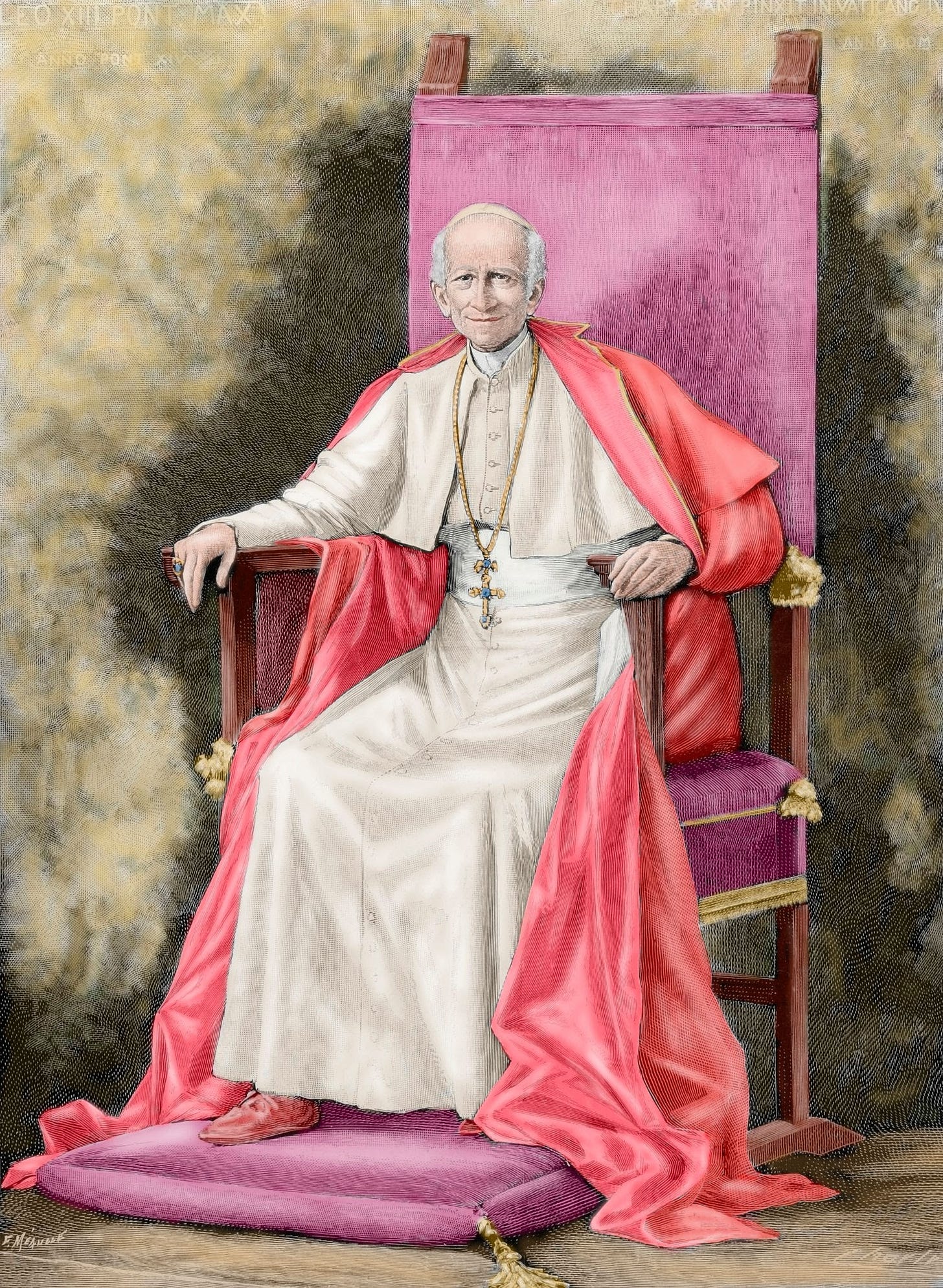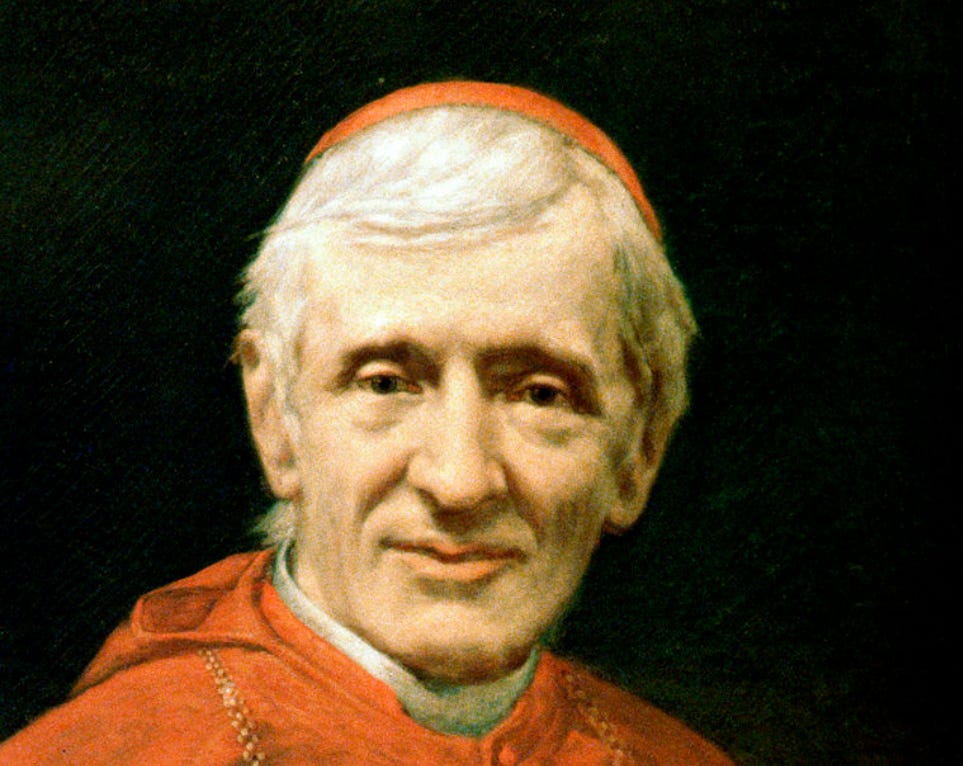20 Reasons Leo the 13th is One of my Favorite Popes
Now that we have a new pope, Leo XIV, I thought I'd make a list in honor of his inspiration and predecessor

Despite being a sort-of papal biographer, I really know nothing about our new pope, Cardinal Robert Francis Prevost, now Leo XIV, but I have been collecting trivia about the pope he named himself after, Leo XIII (the 13th, for those of us who get confused by Roman numerals), for years. Mainly because his name kept showing up again and again, whether because of the prayer to St. Michael he composed, or his role in the life of St. Therese, or because he showed up in one of my favorite of Chesterton’s Father Brown stories. He was not only very much concerned with helping the poor but also with spiritual warfare—as well as intellectual pursuits—as well as the problems facing the modern world—as well as promoting the love of Christ and devotion to Our Lady. Plus in his cheerful friendly disposition, he captured the hearts of many, while playing pivotal roles in the lives of other noted people. I bet you haven’t realized how much he continues to influence us today! So on the happy election of the 266th successor of St. Peter, I’d like to offer my top 20 reasons for why Pope Leo 13th is one of my favorite popes.
Pope Leo XIII
Composed the powerful prayer to St. Michael the Archangel to be said after every Mass (our parish still says it). Some say he had a vision of Satan asking God for permission to attack the Church for 100 years, but whether or not this popular tale is true, it is certain that he composed and recommended this prayer as a safeguard against “the wickedness and snares of the devil.”
Published Rerum Novarum, the hugely important encyclical on economics in the modern world, setting forth the Church’s post-industrial-revolution philosophy of work, elaborated on every fifty years by successive popes. This inspired the movement known as distributism, the Solidarity movement, and its ripples of influence continue to this very day.
Made the celebrity convert St. John Henry Newman a cardinal. Given that Newman not only caused a renewal of tradition in the Anglican Church (the Oxford Movement) which led, incredibly enough, to the establishment of the Anglican Rite Ordinariate in the Catholic Church, but also converted to the Catholic faith, wrote a classic spiritual autobiography explaining why he did, and helped establish an oratory which later converted the family of J.R.R. Tolkien, I’m happy to think Pope Leo was among the people to recognize Newman’s greatness while Newman was still alive. How often does that happen?
Re-opened the Vatican Observatory and opened the Vatican’s Secret Archives to researchers whether impartial or critical, saying “Go to the sources. That is why I have opened the archives to you. We are not afraid of people publishing documents out of them.”
During a cholera pandemic in Rome, converted part of the Vatican into a hospice to take care of the poor.
Declared the Venerable Bede to be a doctor of the church. I was happy to discover this long-neglected but incredibly talented historian got some recognition.
As archbishop, his numerous charitable activities included starting banks for the poor giving out low-interest loans. His papacy was characterized by championing the cause of the working poor, as others have noted.
As pope from 1878-1903, he was the first pope to have his voice recorded and to appear on film. Since he was born in 1810, he is the earliest-born person known to have been filmed.
Joined the ranks of popes who had to write an encyclical condemning slavery, (John Paul II also wrote against it in Veritatis Splendor).
Leo also wrote encyclicals to condemn Freemasonry and Americanism. From time to time I run into these ideologies and it’s interesting he, a normally broad-minded person, found them dangerous.
Instituted the Feast of the Holy Family which is celebrated days after Christmas on Dec. 28.
Consecrated the entire world to the Sacred Heart of Jesus on the feast of the Sacred Heart on June 11, 1899, and was among the first popes to promote the First Friday devotion.
Foreseeing the great evils that would come with the legalization and spread of divorce, he wrote an encyclical in defense of marriage, Arcanum Divinae, warning, “Matrimonial contracts are by it made variable; mutual kindness is weakened; deplorable inducements to unfaithfulness are supplied; harm is done to the education and training of children; occasion is afforded for the breaking up of homes; the seeds of dissension are sown among families; the dignity of womanhood is lessened and brought low, and women run the risk of being deserted after having ministered to the pleasures of men.”
Wrote Providentissimus Deus, an encyclical calling for a return to appreciation of the Sacred Scripture in theology which even won the admiration of Protestants, and founded the Pontifical Biblical Commission
And as if he hadn’t already written so many landmark encyclicals, he also wrote Aeterni Patris promoting the study of Thomism and sparking new interest in the medieval philosopher which led to what’s now called the Neo-Scholastic revival.
An ecumenical pioneer, he reached out to the Anglican and Coptic Churches, helped heal a schism in the Armenian church, and called for the preservation of the Eastern Rite liturgies by opening seminaries for those churches.
Broadened the range of nations from which cardinals could be drawn, appointing the first cardinals to Australia, Armenia, Canada, and Slovenia.
Canonized St. Rita of Cascia, patron saint of impossible causes and beatified Edmund Campion and several other English martyrs.
Told St. Therese of Lisieux when she broke protocol during a papal audience to ask if she could enter Carmel at 15, “If it is God's will that you should enter the Convent, then it shall be.” She did enter, though still a teenager, and died at the age of 24 after writing a new spiritual classic and worldwide bestseller, The Story of a Soul. She was canonized quickly in 1914 and made a Doctor of the Church in 1997.
Was “always rather a favorite” of the fictional priest Father Brown, and presumably also of his creator, G.K. Chesterton, who credits the pope with a spiritual exercise recognizing human evil in oneself, learning to say, “If not for the grace of God, there would go I,” when hearing of an evil person or deed.
Prayers for the radiant soul of Pope Leo XIII (may he be raised to the altars) and for the forthcoming papacy of his namesake, Leo XIV!







